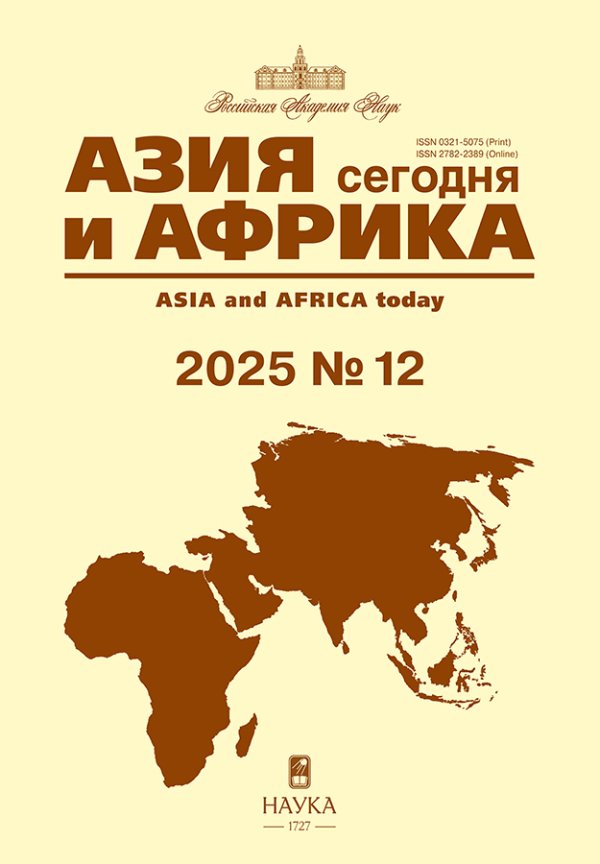No 2 (2025)
Top problem
Russia-China Strategic Partnership. Theory and Practice
Abstract
The formula of the Russian-Chinese comprehensive strategic partnership requires not only an empirical description and study, but also a theoretical justification. It is necessary to analyze the phenomenon of strategic partnership from the perspective of modern international relations theory, including Western, Russian and Chinese ones. Partnerships and strategic partnerships in modern diplomatic practice of China also need to be considered and analyzed. The main features of the Russian-Chinese relations of comprehensive strategic partnership include political and strategic mutual trust; mechanisms of exchange and cooperation at the high level and in various fields; coordination of development strategies; strengthening the social and public basis of mutual relations; strategic coordination in the sphere of foreign policy, as well as a joint response to threats and challenges to international security. The prospects for the development of Russian-Chinese relations of comprehensive strategic partnership will depend on the parties’ awareness of its non-linear nature, the optimal balance of commonality and differences in views and approaches, as well as determining the directions of the evolution of the strategic partnership.
Asia and Africa Today. 2025;(2):5-13
 5-13
5-13


Politics, economics
Digital Sovereignty of African Countries: Threats and Ways to Protect Them
Abstract
The article analyzes the consequences of digitalization of the African continent in the context of technological, economic and political rivalry between the United States and China, and Africa’s growing dependence on external partners. The central issue is data security, the process of using the data is considered by the experts through the concepts of “data colonialism”, “digital colonialism” and “digital sovereignty”. The author notes that, on the one hand, digital technologies can contribute to increased productivity, dynamic growth, structural changes and the implementation of the Sustainable Development Goals on the African continent; on the other hand, they create new problems and challenges. It is concluded that the digital sovereignty of the states of the African continent, in addition to technological and economic problems, is hampered by competition in cyberspace of extraregional actors, primarily the United States, China and the EU, in the regulatory and legal field, which is taking on a political and ideological nature. It is extremely difficult to achieve digital sovereignty, understood as the right of states to regulate and exercise control over technologies, services and digital data used on sovereign territory in the current circumstances due to the fact that overcoming of quite a few issues is impossible without investment and participation of Western and Asian digital giants, which, in the context of active competition for Africa, are themselves the cause of them.
Asia and Africa Today. 2025;(2):14-22
 14-22
14-22


Iran and the SCO: New Prospects
Abstract
The article examines the reasons and consequences of Iran’s accession to the Shanghai Cooperation Organization. The influence of systemic US pressure on Iran’s foreign policy and its strategy in Eurasia is a highly significant factor. However, despite economic sanctions, Iran finds ways to respond to challenges, including cooperation with international organizations. The level of pressure on Iran has varied under different US administrations: minimal under B.Obama, maximal under D.Trump, moderate under D.Biden. Depending on the level of pressure, Iran uses its membership in the SCO for different purposes: under strong pressure – to strengthen its own security and obtain political support, under moderate pressure – for consultations on regional security issues, and under weak pressure – to advance security initiatives. Thus, Iran’s interaction with the SCO reflects its approach to the formation of a network of diplomatic relations and may indicate prospects for international security in the Eurasian space.
Asia and Africa Today. 2025;(2):23-32
 23-32
23-32


What are the Risks of Expanding the Functions of the UN Command in Korea?
Abstract
The article examines the process of strengthening and expanding the role of the United Nations Command (UNC) in Korea, initiated by the United States, as well as presents the positions of the South Korean administrations of Moon Jae-in (2017–2022) and Yoon Suk-yeol (2022 – present) regarding this issue. Unlike the Moon government, the current Yoon government has expressed a willingness to actively participate in the “revitalization” of the UNC. It is concluded that the UNC mechanism is used by Washington to involve Seoul in regional security cooperation, including that aimed against China. The activation of the UNC contributes to higher conflict potential in the region, due to which the return to the Republic of Korea (ROK) of operational control of its armed forces in wartime under the current arrangements seems to be a distant prospect. At the same time, in the context of the expanding role of the UNC on the Korean Peninsula, the possible transfer of wartime operational control to the ROK would have a rather nominal significance.
Asia and Africa Today. 2025;(2):33-41
 33-41
33-41


Government Support for the Digital Transformation of SMEs in India
Abstract
The digital transformation of SMEs (small and medium enterprises) in India is crucial for boosting competitiveness, operational efficiency, and economic contribution. Also, it helps to address unemployment, regional disparities, and promotes sustainable growth of companies. However, SMEs face challenges like financial constraints, lack of digital skills, resistance to change, inadequate infrastructure, and cybersecurity issues. For example, over 70% struggle with funding, only 27% have trained personnel, and 35% face internet connectivity issues. This study explores the impact of government initiatives like Digital India, CGTMSE (Credit Guarantee Fund Trust for Micro and Small Enterprises), Digital MSME Scheme, and the National Digital Literacy Mission in overcoming these barriers. These efforts have significantly increased broadband access and provided collateral-free credit to mlns of SMEs. Continuous enhancement of such programs is vital for driving sustainable economic growth in India.
Asia and Africa Today. 2025;(2):51-59
 51-59
51-59


Challenges of Digital Economy Governance: The Case of Data Localization in India
Abstract
The article focuses on the Indian Data Protection Law, which was introduced to the public in 2018, and the final version was adopted only in 2023. One of the most important clauses that changed was the clause on data localization: it disappeared in the final version of the law. In global practice, as a rule, data localization laws require that data on citizens or residents of a country be collected, processed, and stored within the country. Countries enacting data localization laws must choose between ensuring the safety and security of their citizens’ data and freeing data movement, including across borders, to advance the digital economy and innovation. This article examines how the Indian government made this choice, what factors played a decisive role, and how this characterizes the overall government policy in developing the digital economy.
Asia and Africa Today. 2025;(2):42-50
 42-50
42-50


China: Parameters of State Interaction with Small and Medium-sized Businesses
Abstract
Small and medium businesses in China are actively involved in the modernization of the state and the creation of “productive forces of a new quality.” Their economic and innovative potential is rapidly increasing, their spheres of activity are expanding, and the number of enterprises is growing. The article examines the process of forming and applying standards for classifying small and medium enterprises (SMEs) in quantitative and qualitative terms. The contribution of micro, small and medium entrepreneurship to the socio-economic and innovative development of the country is shown. Determining the status of a small and medium business entity is directly related to the practice of taxation and financing of market entities, and gives medium, small and micro enterprises (MSMEs) the right to use benefits and preferences intended only for them. Particular attention is paid to the analysis of the creation of a qualification assessment system for innovative SMEs of various types. The development of a rational model of quantitative and qualitative parameters for identifying enterprises enables the state to effectively apply various tools and methods for monitoring, supporting and stimulating the activities of SMEs at various stages of the country’s modernization.
Asia and Africa Today. 2025;(2):60-66
 60-66
60-66


School Reform in China as Part of the Country’s Socio-Economic Development Strategy
Abstract
In recent years, China has faced new challenges: depopulation and a decline in the working-age population, a rapid increase in higher education enrollment and rising youth unemployment, a significant decline in the fertility rate, and the ineffectiveness of the new demographic policy. Socioeconomic problems are complicated by growing tensions with western countries and restrictions on Chinese companies’ access to foreign technology. In the current circumstances, there is a pressing need for a new educational reform. This study aims to analyze the transformations in school education in China. At present, the reform has not yet solved all the tasks assigned to it. Note the reduction in the workload of students and the costs of education. More complex problems of socio-economic development associated with the demographic transition cannot be solved at this stage by means of school reform alone. Its effect is only temporary, and it is highly likely that it will need to be further deepened and extended to other areas.
Asia and Africa Today. 2025;(2):67-76
 67-76
67-76


Book review
 77-80
77-80













